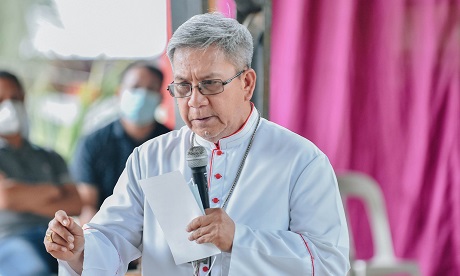Caritas Philippines is begging Japan to stop dumping treated radioactive water into the Pacific Ocean.
Fukushima’s plant operator, Tokyo Electric Power Company (TEPCO), started releasing the water into the ocean on 25 August. It says it will continue to do so for several years.
Bishop Jose Colin Bagaforo (pictured), president of Caritas Philippines, says Caritas is extremely concerned the move will harm nature and the population.
“We call on the Japanese government to reconsider its decision, and to find a safe and responsible way to dispose of the contaminated water,” he says.
“The decision is a reckless gamble with the health and well-being of people and the environment.”
Leaders divided
Caritas Philippines echoes the opposition of most, but not all, East Asian leaders, Catholic groups, opposition parties, environmentalists, scientists and fishing communities.
China calls the radioactive water dump “extremely selfish”. It has summoned the Japanese ambassador to file a formal diplomatic protest.
China has also imposed a new ban on seafood imports from Japan.
But Japan says the water is safe and won’t affect the environment.
South Korean President Yoon Suk-yeol supports Japan’s view.
He says “the executive found no problem in the scientific and technical aspects of the Japanese plan.”
It meets international standards and the impact on the population and the environment would be “negligible” the executive decided.
Many South Koreans are worried about radioactive water and possible contamination of seafood and the oceans, however.
Democratic Party leader Lee Jae-myung calls the water dump “an act of terror”. The Party intends to hold the Government accountable for failing to fulfil its duties, he says.
Environmental groups, student committees and civil society organisations have been demonstrating in Japan and South Korea.
Local regional governments in Korea are strengthening seafood product testing to ease consumer concerns.
This will involve daily tests on all seafood products in main markets, publishing and disseminating the results in real time.
The Korean Federation for Environmental Movements criticised Tokyo’s decision. It “threatens fishery products and jeopardises the security of the Pacific countries,” they said.
Catholic opposition
The Korean Catholic bishops and 42 other Catholic organisations oppose Japan’s water dump decision.
In a joint statement at the end of June, they expressed their “extreme concern”.
Catholic groups have rejected the Japanese government’s claim that “the contamination caused by the radioactive leak is calming down and the Fukushima area is safe”.
The April 2023 “Analysis Report on Radioactive Contamination of Japanese Agricultural and Livestock Products” says there is a wide range of radioactive contamination in food products.
It says 5.3 percent of marine, 21.1 percent of agricultural and 2.6 percent of animal products are affected.
The report urges precaution and prudence regarding human health and the ecosystem.
In 2021, the Korean and Japanese bishops jointly declared their opposition to the water dump. Human health and creation must be preserved they said.
Source
Additional readingNews category: World.




